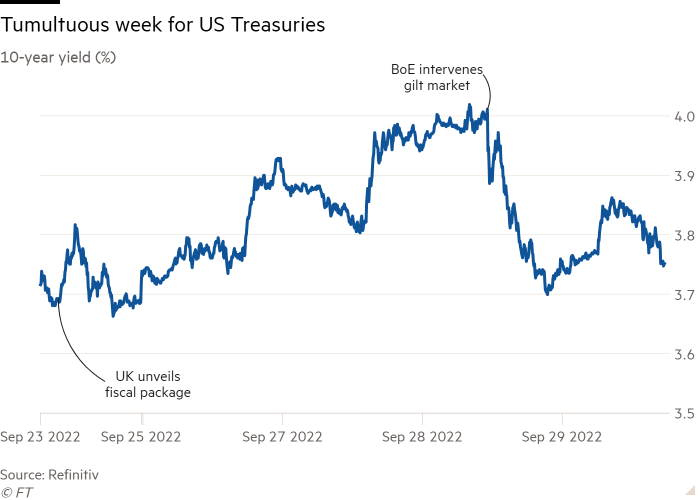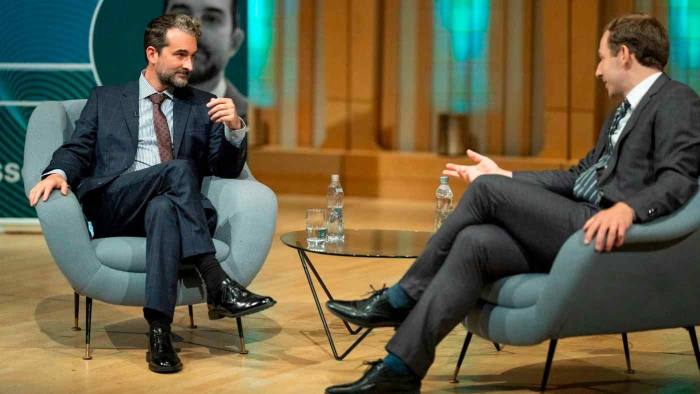Good morning. This article is an on-site version of our FirstFT newsletter. Sign up to our Asia, Europe/Africa or Americas edition to get it sent straight to your inbox every weekday morning
Liz Truss is under mounting pressure to change course on her tax and borrowing plans after an opinion poll gave Labour a historic 33-point lead over the Conservatives, the biggest gap since the 1990s.
The YouGov survey for The Times was published after Truss vowed to stick by the government’s “mini” Budget, including £45bn of debt-funded tax cuts, which sparked turmoil in financial markets.
The pound clawed back losses this morning in Asia following the Bank of England’s dramatic £65bn bond-buying intervention on Wednesday to stem a pensions system crisis, rising as much as 0.8 per cent against the dollar to $1.1203.
But the BoE is facing calls to tighten its scrutiny over “time-bomb” hedging strategies for pension funds, which were threatened when a steep jump in gilt yields sparked a wave of margin calls. The turmoil in UK government debt has also sent shockwaves through global markets, sparking big swings in US and European bonds.
The weakness in sterling has failed to lure pension funds and insurers to committing cash to UK-focused buyout groups, in a sign that Chancellor Kwasi Kwarteng’s fiscal plan has dented the UK’s appeal to global investors.
John Burn-Murdoch argues the government has unmoored itself from the British people with its extreme economic position.

Thanks for reading FirstFT Europe/Africa. Now for the rest of the day’s news — Jennifer
Five more stories in the news
1. Russia to annex Ukrainian regions Vladimir Putin will today annex four regions in south-eastern Ukraine — none of which Moscow fully controls — following highly stage-managed votes last that Russia claimed showed support by margins of up to 99 per cent.
“The territorial integrity of Ukraine will be restored” — Volodymyr Zelenskyy, Ukraine’s president
2. Germany releases €200bn energy aid package Chancellor Olaf Scholz yesterday announced a multibillion-euro “protective shield” for businesses and consumers struggling with soaring energy costs, the largest such energy aid package from a European government. The plan was unveiled as new data showed German inflation rose to double-digit levels for the first time in more than 70 years.
3. Emmanuel Macron buckles on raising retirement age The French president has decided against raising the retirement age from 62 to 65 in this autumn’s budget, backing off from a proposal that had angered labour unions and divided his centrist alliance.
4. Catalan government narrowly avoids collapse The wealthy Spanish region’s government temporarily avoided collapse yesterday after an affronted coalition partner opted to consult its members rather than immediately withdraw over the president’s sacking of his deputy, a move that underlined divisions in the independence movement.
5. Deloitte UK partner pay rises past £1mn Partners took home £1,058,000 on average this year, topping last year’s payout by £8,000, thanks to booming activity in its mergers and acquisitions advisory business. But the Big Four auditor’s boss warned it faced “economic headwinds”.
How well did you keep up with the news this week? Take our quiz.
The days ahead
UK workers strike over pay Communications Workers Union members employed by the Royal Mail begin a two-day walkout today. Tomorrow, rail staff in the RMT and Aslef unions kick-start the first of two 24-hour strikes.
Inflation indicators The EU publishes September consumer price data for the 19-member eurozone, which rose 9.1 per cent last month, the fastest pace since records began in 1997. The UK releases a revised estimate of second-quarter gross domestic product, which fell 0.1 per cent in the preliminary reading. Italy and France have September CPIs while Germany publishes monthly unemployment, import prices and retail sales figures.
Cineworld earnings The ailing British cinema chain reports half-year results, which are expected to show a profit in contrast to last year’s loss. But focus will turn to its latest cash position and net debt levels after the company filed for bankruptcy protection in the US this month.
National holidays Nigeria commemorates 62 years of independence from British rule tomorrow. The same day marks the founding of the People’s Republic of China. Many in China will be staying put during this year’s Golden Week, a popular time to travel, because of Covid-19 restrictions. (SCMP)
Conservative party conference The UK ruling party’s annual event begins in Birmingham on Sunday, as leader and prime minister Liz Truss and her government face a crisis arising from her tax and borrowing plans.
Elections Latvians vote in a general election tomorrow, with polls favouring Prime Minister Krisjanis Karins’ New Unity party to defeat the Russia-friendly opposition Harmony party. On Sunday, Brazilians go to the polls for the first round of the presidential vote, the most important in decades, pitting incumbent Jair Bolsonaro against former leader Luiz Inácio Lula da Silva. Bosnia and Herzegovina holds a general election on Sunday, while Bulgaria has its fourth parliamentary election in two years. (WashPost, FT)
What else we’re reading
For a fascist revival look to Moscow, not Rome With the victory of the far-right in Italy, there were warnings of a new “Benito Mussolini” era. But to present Giorgia Meloni as a direct line from Mussolini is a journalistic flourish too far, writes Timothy Garton Ash. The real fascists are revealing themselves elsewhere — in Russia.
Liz Truss’s growth delusion There is a fashionable line of attack against the prime minister’s single-minded focus on growth: what about the poor? What about the planet? In chasing GDP growth, this critique runs, Truss shows herself to be a politician who knows the price of everything and the value of nothing, writes Tim Harford.
How to pick winning teams Decision-making is often framed in terms of “art versus science”, with the assumption that in our digital age, the human factor is increasingly marginalised. But in the age of data, in sport as well as life, where does the human dimension fit into making decisions? Former England cricket selector Ed Smith explores.
Fiscal fisticuffs between the IMF and Britain The stinging rebuke arrived at the worst moment: with sterling selling off and borrowing costs surging, the IMF urged the UK to “re-evaluate” its £45bn package of debt-funded tax cuts. Did the IMF overstep its remit by weighing in on domestic policy outside a scheduled review?
Cheating accusations in the chess world US teenager Hans Niemann’s shock victory over world chess champion Magnus Carlsen this month might have been celebrated as the arrival of a new force in the ancient game of strategy. But wild rumours of dirty tricks have started to swirl.
Life & arts
Look closely at episode 8 of Industry season 2 and you may see a familiar face: the FT’s own Henry Mance. He writes about how he landed a starring role — or, perhaps more accurately, bit — in the TV series.

Thank you for reading and remember you can add FirstFT to myFT. You can also elect to receive a FirstFT push notification every morning on the app. Send your recommendations and feedback to firstft@ft.com


